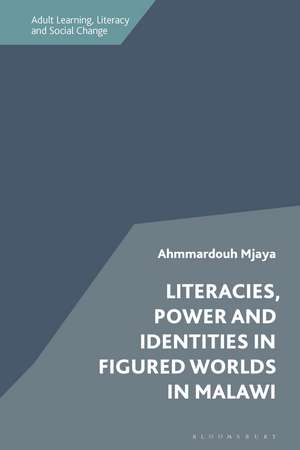Literacies, Power and Identities in Figured Worlds in Malawi: Adult Learning, Literacy and Social Change
Autor Dr Ahmmardouh Mjayaen Limba Engleză Paperback – 20 sep 2023
| Toate formatele și edițiile | Preț | Express |
|---|---|---|
| Paperback (1) | 189.80 lei 6-8 săpt. | |
| Bloomsbury Publishing – 20 sep 2023 | 189.80 lei 6-8 săpt. | |
| Hardback (1) | 567.58 lei 6-8 săpt. | |
| Bloomsbury Publishing – 23 mar 2022 | 567.58 lei 6-8 săpt. |
Preț: 189.80 lei
Preț vechi: 248.54 lei
-24% Nou
Puncte Express: 285
Preț estimativ în valută:
36.33€ • 39.48$ • 30.54£
36.33€ • 39.48$ • 30.54£
Carte tipărită la comandă
Livrare economică 21 aprilie-05 mai
Preluare comenzi: 021 569.72.76
Specificații
ISBN-13: 9781350296176
ISBN-10: 1350296171
Pagini: 184
Ilustrații: 17 bw illus
Dimensiuni: 156 x 234 x 25 mm
Greutate: 0.26 kg
Editura: Bloomsbury Publishing
Colecția Bloomsbury Academic
Seria Adult Learning, Literacy and Social Change
Locul publicării:London, United Kingdom
ISBN-10: 1350296171
Pagini: 184
Ilustrații: 17 bw illus
Dimensiuni: 156 x 234 x 25 mm
Greutate: 0.26 kg
Editura: Bloomsbury Publishing
Colecția Bloomsbury Academic
Seria Adult Learning, Literacy and Social Change
Locul publicării:London, United Kingdom
Caracteristici
Shows that power is not a commodity which some community members possess and others lack, but that even those occupying low social positions have the ability to act when provided with adequate literacy skills
Notă biografică
Ahmmardouh Mjaya is Lecturer in African Languages and Linguistics and a Ciyawo Language Specialist at Chancellor College, University of Malawi, Malawi.
Cuprins
Series Editor Foreword1. Research Background and Context 2. Literacy as a Social Practice: Exploring Theoretical Issues3. Using Ethnography to Study Community Members' Literacy Practicesin their Everyday Life4. Literacy Practices in Community Members' Lived Worlds5. Identities and Power in Reading and Writing Spaces6. The Adult Literacy Class: A Site of Power Struggle7. Mbecete m'Ciyawo: Matters of Language8. Conclusions and Implications for Researching Literacy as a Social Practice References Index
Recenzii
Mjaya's research provides valuable reading for literacy theorists and practitioners alike. ... [the] hope is that this book will inspire those engaged in literacy work with adults to renew their commitment to exploring new approaches to their fundamentally important task, complex though it is.
This book will be a rich and interesting source for students of international development, adult learning and literacy. It makes for accessible reading for policy-makers and teachers, as well as being a useful guide for others planning to carry out ethnographic studies in international settings. As a study by an African scholar of an under-researched country it is ground-breaking and illuminating. As long as literacy continues to be a focus of international agencies and funding, it is essential that policy learns from such studies.
Mjaya renews theoretical and methodological perspectives on social studies of literacy with an exceptionally detailed ethnographic insight into the everyday literacy of adult learners in rural Malawi. The book challenges some of conventions of Western-dominated anthropology in a highly reflexive discussion of the meaning of "being there" while also carving a new space for Africa's qualitative socialsciences in their engagement with national policies.
This book will be a rich and interesting source for students of international development, adult learning and literacy. It makes for accessible reading for policy-makers and teachers, as well as being a useful guide for others planning to carry out ethnographic studies in international settings. As a study by an African scholar of an under-researched country it is ground-breaking and illuminating. As long as literacy continues to be a focus of international agencies and funding, it is essential that policy learns from such studies.
Mjaya renews theoretical and methodological perspectives on social studies of literacy with an exceptionally detailed ethnographic insight into the everyday literacy of adult learners in rural Malawi. The book challenges some of conventions of Western-dominated anthropology in a highly reflexive discussion of the meaning of "being there" while also carving a new space for Africa's qualitative socialsciences in their engagement with national policies.




